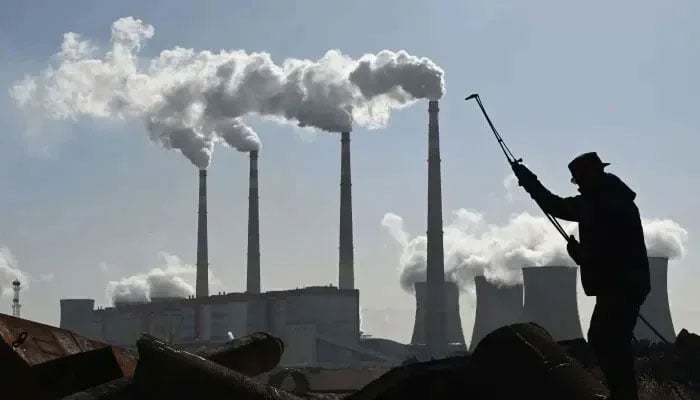National dialogue may achieve 60pc cut in greenhouse gas emissions: PRGMEA
LAHORE: Stressing the need for coherent bold action for a resilient future, the Pakistan Readymade Garments Manufacturers and Exporters Association (PRGMEA) highlighted on Monday the government’s commitment to ambitious climate action as outlined in its revised nationally determined contributions (NDCs), submitted in 2021 under the Paris Agreement.
PRGMEA North Zone Chairperson Dr Ayyazuddin said that the country aims to achieve a 60 per cent reduction in greenhouse gas emissions by 2030, with 15 per cent of the target being unconditional and the remaining 35 per cent dependent on international financial support. The updated NDCs also set a goal of ensuring that 60 per cent of the national energy mix comes from renewable sources by 2030, paving the way for a sustainable and low-carbon energy future.
By 2030, the country plans to have 30 per cent of all vehicles on its roads powered by electricity, reducing emissions from the transportation sector. Complementing these measures, a nationwide ban on coal imports and expanded nature-based solutions underscore Pakistan’s commitment to environmental sustainability. Key adaptation strategies include enhancing water recharge systems, reducing flood risks and increasing protected areas from 12 per cent to 15 per cent by 2030.
Dr Ayyazuddin noted that the global stocktake under the Paris Agreement -- the first of its kind -- revealed mixed progress in global climate goals. He explained that NDCs are central to the Paris Agreement, outlining each nation’s strategies for reducing greenhouse gas emissions and adapting to climate change impacts. These contributions serve as vital tools for achieving the agreement’s long-term goal of limiting global warming to 1.5 degrees C.
NDCs, submitted every five years to the UNFCCC Secretariat, are designed to demonstrate the highest possible ambition, building on previous commitments to advance impactful climate action. While some progress has been made, the world remains off track to achieve its temperature goals. The upcoming NDC 3.0, set for submission in 2025, presents a critical opportunity for nations, including Pakistan, to bridge this gap.
Dr Ayyazuddin expressed that NDC 3.0 would be more ambitious and progressive, incorporating insights from the global stocktake to align with an emissions trajectory that meets the Paris Agreement’s objectives. For Pakistan, this represents a pivotal moment to assert its leadership in climate action and ensure sustainable development.
“At this crucial juncture in its climate journey, Pakistan’s success under NDC 3.0 depends on inclusivity and collaboration,” he said. “Achieving these ambitious goals requires a comprehensive, multi-stakeholder approach involving the government, private sector, academia, and international donors.”
A ‘grand dialogue’ among stakeholders is essential to build understanding, strengthen consensus and drive actionable solutions. This collaboration will enhance Pakistan’s resilience to climate change and ensure an equitable, sustainable future for all. Such an approach aligns with the country’s commitment to the Paris Agreement while fostering development that benefits every segment of society.
-
 Jerome Tang Calls Out Team After Embarrassing Home Defeat
Jerome Tang Calls Out Team After Embarrassing Home Defeat -
 Cynthia Erivo Addresses Bizarre Rumour About Her Relationship With Ariana Grande
Cynthia Erivo Addresses Bizarre Rumour About Her Relationship With Ariana Grande -
 Prince Harry, Meghan Markle Spotted Cosying Up At NBA All-Star Game
Prince Harry, Meghan Markle Spotted Cosying Up At NBA All-Star Game -
 Lady Gaga Explains How Fibromyalgia Lets Her 'connect With People Who Have It'
Lady Gaga Explains How Fibromyalgia Lets Her 'connect With People Who Have It' -
 Metro Detroit Weather Forecast: Is The Polar Vortex Coming Back?
Metro Detroit Weather Forecast: Is The Polar Vortex Coming Back? -
 Daniel Radcliffe Reveals Surprising Way Fatherhood Changed Him
Daniel Radcliffe Reveals Surprising Way Fatherhood Changed Him -
 ‘Disgraced’ Andrew At Risk Of Breaking Point As Epstein Scandal Continues
‘Disgraced’ Andrew At Risk Of Breaking Point As Epstein Scandal Continues -
 Alan Cumming Shares Plans With 2026 Bafta Film Awards
Alan Cumming Shares Plans With 2026 Bafta Film Awards -
 OpenClaw Founder Peter Steinberger Hired By OpenAI As AI Agent Race Heats Up
OpenClaw Founder Peter Steinberger Hired By OpenAI As AI Agent Race Heats Up -
 Kate Middleton's Reaction To Harry Stepping Back From Royal Duties Laid Bare
Kate Middleton's Reaction To Harry Stepping Back From Royal Duties Laid Bare -
 Rose Byrne Continues Winning Streak After Golden Globe Awards Victory
Rose Byrne Continues Winning Streak After Golden Globe Awards Victory -
 Ice Hockey Olympics Update: Canada Stays Unbeaten With Dominant Win Over France
Ice Hockey Olympics Update: Canada Stays Unbeaten With Dominant Win Over France -
 Brooklyn Beckham Makes This Promise To Nicola Peltz Amid Family Feud
Brooklyn Beckham Makes This Promise To Nicola Peltz Amid Family Feud -
 Chinese New Year Explained: All You Need To Know About The Year Of The Horse
Chinese New Year Explained: All You Need To Know About The Year Of The Horse -
 Canadian Passport Holders Can Now Travel To China Visa-free: Here's How
Canadian Passport Holders Can Now Travel To China Visa-free: Here's How -
 Maya Hawke Marries Christian Lee Hutson In New York Ceremony
Maya Hawke Marries Christian Lee Hutson In New York Ceremony




